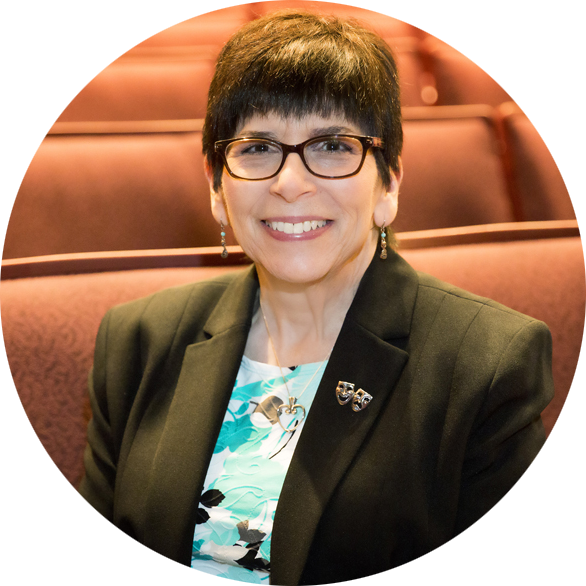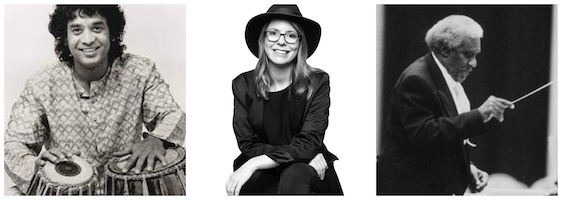by Jarrett Hoffman

•Today: Apollo’s Fire, The Cleveland Orchestra, Cleveland Uncommon Sound Project, and Oberlin Opera Theater
•Announcements & job listings: Janet Barlow (pictured) retires from Stocker Arts Center, Credo Music seeks an executive director, and Lima Symphony holds horn and flute auditions
•Almanac: Zakir Hussain, Anna Clyne, and Coleridge-Taylor Perkinson
HAPPENING TODAY:
At 7:30, you have your choice between Apollo’s Fire in a new program titled “Exile: Music of the Jewish & African Diasporas,” and The Cleveland Orchestra, who will be joined by the Cleveland Orchestra Chorus for a playlist that includes Richard Strauss’s Metamorphosen and Mozart’s Requiem.
And at 8, you can check in with the Cleveland Uncommon Sound Project for a program featuring The Evolution of the Arm (a quartet made up of oboe, piano, violin, and cello) with cellist Khari Joyner as the opener. Or you can head to Oberlin Opera Theater for Bernstein’s Candide in director Jonathon Field’s final production before retiring. (Read an interview with Field here.)
Ticket links and more details in our Concert Listings.
ANNOUNCEMENTS & JOB LISTINGS:
Stocker Arts Center director Janet Herman Barlow has retired after 18 years in that position. And as John Benson writes in The Chronicle-Telegram, “One of the driving reasons was an unintentional gift from her husband, Jim, who died 11 years ago.” As Barlow said in an interview, “Jim was in the middle of a teaching semester and in the ICU dying. He asked me to bring him his class materials so he could write up his final so his students wouldn’t lose credit. At that point, I decided I didn’t want to be on my death bed marking up an artist contract.” Read the article here.
Credo Music is looking for an executive director, who will be responsible for “all administrative functions including the broad areas of finance, operational support to Credo’s programming, and, importantly, fundraising”. The application deadline is April 15. You can find more information here.
And the Lima Symphony will be holding auditions for the positions of principal horn and 3rd flute/piccolo. The horn auditions will include a digital first round (submissions due March 31) and a live round on April 30. On the flute side, auditions will be digital-only (submissions due March 31). More info here.
TODAY’S ALMANAC:
Those figures celebrating birthdays on March 9 include American composer Samuel Barber (born in 1910 in West Chester, PA), Indian tabla player and composer Zakir Hussain (born in 1951 in Bombay), and English composer Anna Clyne (born in 1980 in London).
And classical musicians who have passed away on March 9 include a pair of Americans: composer-conductor Coleridge-Taylor Perkinson (died in 2004 in Chicago, IL) and conductor James Levine (died in 2021 in Palm Springs, CA). German composer and organist Johann Pachelbel, meanwhile, was buried on this date in 1706 — the date of his passing is unknown.
We’ll focus on three of those names based on recent activity in Northeast Ohio.
Zakir Hussain visited the Cleveland Museum of Art last year as part of the trio Triveni, which also includes violinist Kala Ramnath and veena player Jayanthi Kumaresh, and which aims to blend Hindustani and Carnatic musical traditions. Hussain joins Kumaresh here in a live duo performance featuring — as you would expect in this genre and from these players — some amazing improvisations.
Anna Clyne’s Stride — a string orchestra work inspired by Beethoven’s Piano Sonata No. 8 in c (“Pathétique”) — was featured last year in a program by the Scottish Chamber Orchestra when they visited the Tuesday Musical series. As Clyne told Mike Telin in an interview, what especially served as a jumping-off point for her are Beethoven’s “opening octave leaps in the left hand which are almost reminiscent of ‘stride’ piano playing.” Listen here to a performance by Carlos Kalmar and the Oregon Symphony.
And the Allegro from Coleridge-Taylor Perkinson’s String Quartet No. 1 (“Calvary”) was performed just last month in another Tuesday Musical program. While the piece gets its title from the African American spiritual upon which it is based, the composer noted that “When I sat down to write this string quartet, I was not trying to write something Black, I was just writing out of my experience.” Given Perkinson’s wide-ranging musical experiences, including in the worlds of jazz and classical, that makes for a fascinating listen. A quartet from the American Symphony Orchestra performs the first and third movements here.




